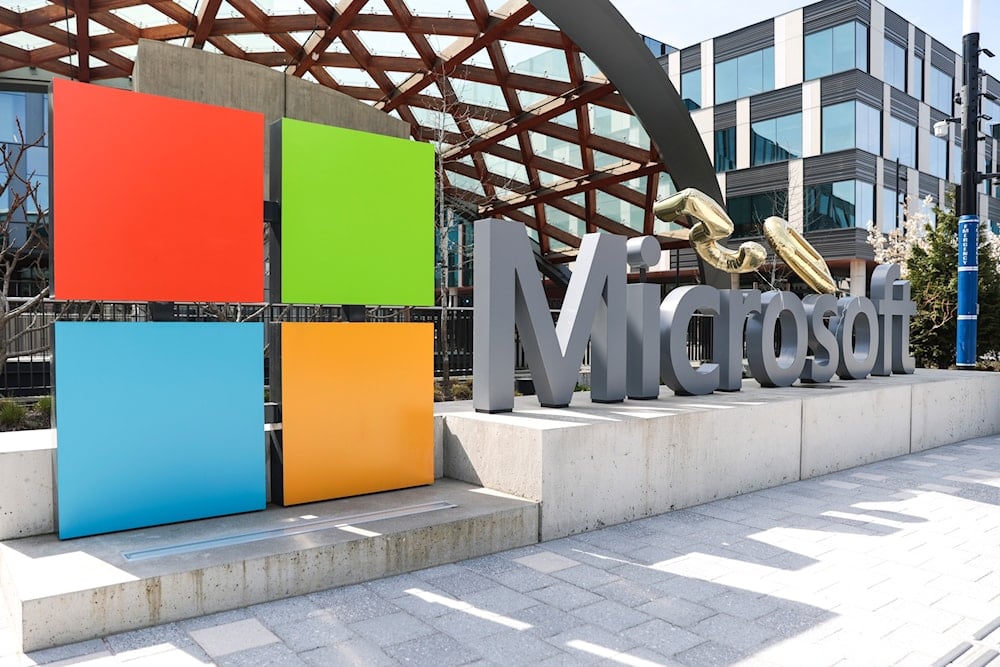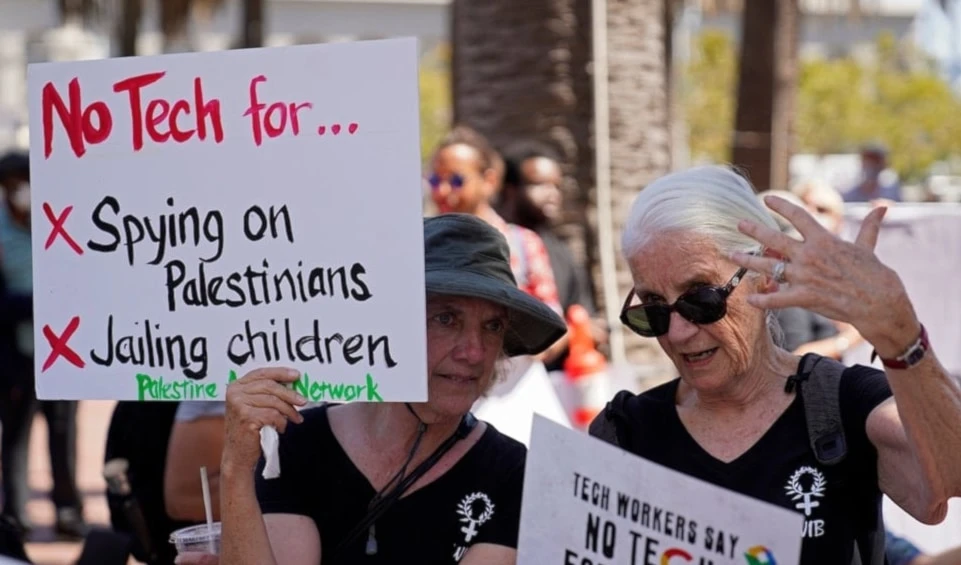Microsoft admits supplying AI to 'Israel' amid Gaza carnage
Microsoft’s disclosure of AI and cloud support to the Israeli military during the Israeli genocide in Gaza has sparked ethical debates, employee protests, and scrutiny over tech’s role in wars.
-

A Microsoft sign and logo are pictured at the company's headquarters, Friday, April 4, 2025, in Redmond, Wash (AP)
Microsoft has confirmed that it provided artificial intelligence and cloud computing services to the Israeli military during its war on Gaza. In a blog post published Thursday, the company disclosed that its technologies, such as Azure AI, cloud storage, and professional support, were made available under special conditions beyond the terms of typical commercial agreements.
The announcement marks the first official acknowledgment by Microsoft of its role in aiding "Israel" since October 7, 2023. According to the post, the company extended “emergency support”, claiming that it was "limited" to aid in captive recovery efforts. “We provided this help with significant oversight and on a limited basis, including approval of some requests and denial of others,” Microsoft stated.
Microsoft alleged that the decision to assist was guided by its internal principles, asserting that support was meant to “help save the lives of hostages" while claiming that it also honored "the privacy and other rights of civilians in Gaza.”
This comes after an investigation by the Associated Press revealed that the Israeli military's use of Microsoft’s Azure services surged nearly 200-fold after October 7. The report noted that the services were employed to analyze mass surveillance data, which could potentially be integrated with proprietary AI systems used for target identification.
Backlash over Gaza civilian casualties, ethical concerns
Critics argue that the announcement leaves crucial questions unanswered, particularly concerning whether its tools were used in the selection of military targets. The company confirmed hiring an external firm for further fact-finding but declined to name it or share the findings. It also noted it had “no visibility into how customers use our software on their own servers or other devices,” nor when accessed via third-party cloud providers.
More than 56,000 people have been killed in Gaza and Lebanon since the start of "Israel’s" aggression, mostly women and children. In February 2024, a brutal Israeli assault on the city of Rafah left at least 60 Palestinians killed. In June, a large-scale airstrike on the al-Nuseirat refugee camp killed at least 274 people, according to health authorities. Both operations were carried out under the pretext of captive recovery but drew international condemnation for the disproportionate loss of civilian life.
Microsoft claims its actions adhered to its Acceptable Use Policy and AI Code of Conduct, which prohibit the use of its technologies to inflict unlawful harm. “We have found no evidence of a violation of our terms,” the company claimed.
Nonetheless, the company’s attempt at transparency has stirred internal and external pushback. “It’s very clear that their intention with this statement is not to actually address their worker concerns, but rather to make a PR stunt to whitewash their image that has been tarnished by their relationship with the Israeli military,” said Hossam Nasr, a former Microsoft employee dismissed after organizing a pro-Palestine vigil.
Employee dissent and calls for full transparency
A collective of employees known as No Azure for Apartheid is demanding that Microsoft publish its full internal investigation. The group accuses the company of evading accountability and misleading the public over the scope of its involvement. Meanwhile, digital rights advocates are also weighing in.
Cindy Cohn, Executive Director of the Electronic Frontier Foundation, commented, “I’m glad there’s a little bit of transparency here. But it is hard to square that with what’s actually happening on the ground.”
Some analysts say Microsoft’s public stance signals a shift in how tech companies engage with wartime governments. Emelia Probasco, a senior fellow at Georgetown University’s Center for Security and Emerging Technology, noted, “It’s like a tank manufacturer telling a country you can only use our tanks for these specific reasons. That is a new world.”
Microsoft remains one of several US-based tech giants, including Google, Amazon, and Palantir, that hold active AI and cloud contracts with the Israeli military.
Read more: Leaked files reveal Microsoft's role in 'Israel's' military operations

 4 Min Read
4 Min Read










